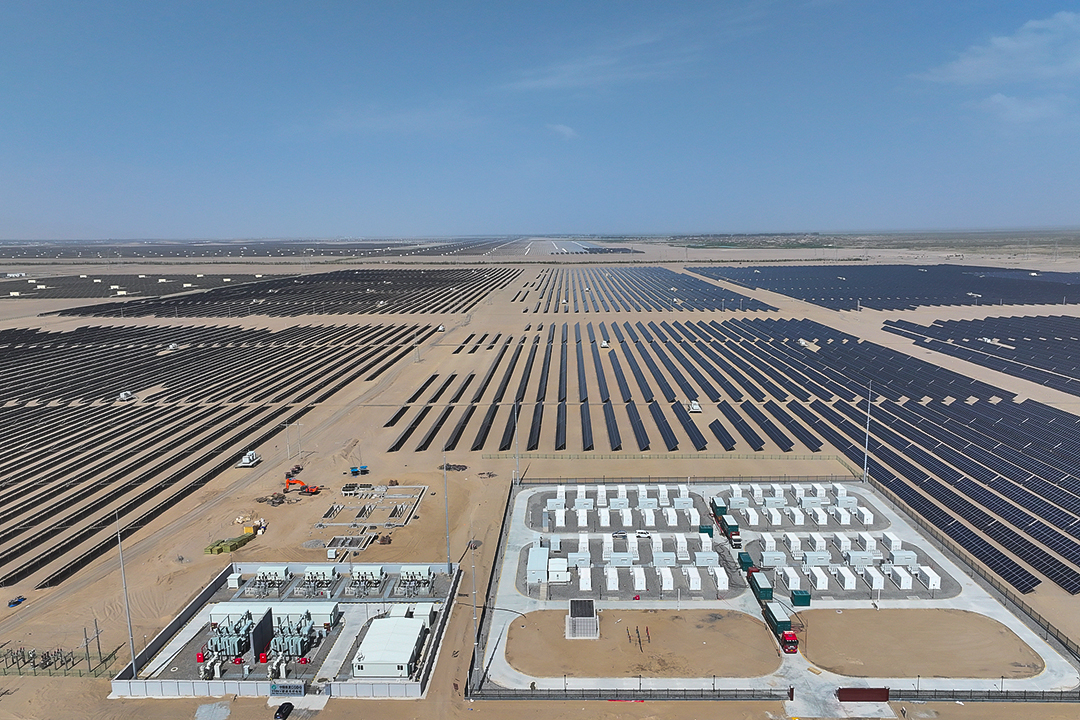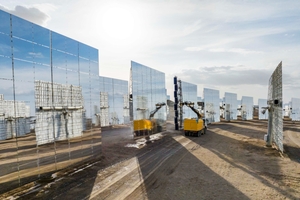Energy Insider: China’s ‘Comprehensive’ Green Transition Plan, NEVs Outsell Fossil-Fuel Cars in July
Listen to the full version

In this week’s Caixin energy wrap, we analyze China’s biggest climate and energy news on policy, industry, projects and more:
●China issues plan for “comprehensive” green transition
●More than half of passenger cars sold in July were NEVs
●Chinese firm completes Saudi oil and gas platform
●Beijing drafts rules for NEV-battery recycling
●Nuclear giant opens plants to tourists

Download our app to receive breaking news alerts and read the news on the go.
Get our weekly free Must-Read newsletter.
- DIGEST HUB
- China released a comprehensive plan for a green transition with specific targets by 2030, including increasing non-fossil energy use to 25%.
- In July, NEVs outsold fossil-fuel cars for the first time, making up 51.1% of passenger car sales.
- China is advancing in energy collaboration with the Middle East, completing a major oil and gas platform for Saudi Arabia’s Marjan oilfield.
The Caixin energy wrap for this week covers significant updates in China’s climate and energy sphere, with a focus on policy, industry, and technological advancements across various sectors.
China has devised an extensive plan to achieve a comprehensive green transition by 2035, with significant progress to be evident by 2030 [para. 5][para. 6]. According to a document published by the country’s central authorities, the plan aims to advance green and low-carbon development across all sectors, from heavy industries to consumer markets [para. 6]. Specific targets include expanding the energy-saving and environmental industry to 15 trillion yuan ($2 trillion), increasing the share of non-fossil energy to 25% from the current 17.9%, and boosting the capacity of pumped-storage hydroelectricity to surpass 120 GW, more than double that of 2023 levels [para. 7]. However, challenges persist, such as a reliance on coal and the emergence of green trade barriers globally [para. 9][para. 10].
For the first time in China's market, new-energy vehicles (NEVs) outsold fossil-fuel passenger cars in July [para. 11][para. 13]. The China Passenger Car Association (CPCA) reported that 878,000 NEVs were sold that month, making up 51.1% of passenger vehicle sales [para. 12]. This surge is attributed to favorable government policies, including a scheme where buyers received a significant cash bonus for trading in old cars for new NEVs [para. 15]. Innovation in plug-in hybrid technology also contributed to this success [para. 15].
A state-owned Chinese fossil fuel company, Offshore Oil Engineering Co. Ltd. (COOEC), has completed a massive oil and gas offshore platform for Saudi Arabia’s Marjan oilfield [para. 19]. This platform, among the largest globally, is taller than a 24-storey building and features a deck the size of 15 basketball courts [para. 20]. It can handle 24 million tons of crude oil and 7.4 billion cubic meters of gas annually [para. 20]. This accomplishment underscores deepening energy cooperation between China and the Middle East, emphasizing traditional fossil fuels while green energy emerges as a new growth driver [para. 21][para. 23].
To address the rapid growth and retirement of NEV batteries, the Ministry of Industry and Information Technology has released draft regulations for battery recycling [para. 25]. Regulating NEV battery recycling is becoming crucial as batteries' lifespan of about eight years leads to a burgeoning "retirement wave" [para. 27]. Projections indicate the volume of end-of-life NEV batteries will rise tenfold from 294,000 tons in 2021 to 3 million tons by 2030, creating a 150-billion-yuan recycling market [para. 28].
China General Nuclear Power Corp. (CGN) has initiated a novel approach to boost tourism by opening its plants to the public [para. 32]. With a digital app launched on August 7, tourists can now book tours to nine nuclear power bases, including Daya Bay, the first commercial nuclear power station on the Chinese mainland [para. 33]. This initiative, known as "nuclear power industrial tourism," not only offers unique experiences but also significantly impacts local economies [para. 35][para. 36].
Each of these updates signifies substantial steps towards China achieving its environmental and technological goals, with a keen focus on transitioning towards sustainable energy practices while addressing existing economic and industrial challenges.
- Offshore Oil Engineering Co. Ltd. (COOEC)
- Offshore Oil Engineering Co. Ltd. (COOEC) is a unit of the China National Offshore Oil Corp. Recently, it completed an oil and gas offshore platform for Saudi Arabia’s Marjan oilfield. The platform, one of the world's largest, can process 24 million tons of crude oil and 7.4 billion cubic meters of gas per year. Its completion marks a significant step in the energy cooperation between China and Middle Eastern countries.
- China National Offshore Oil Corp. (CNOOC)
- China National Offshore Oil Corp. (CNOOC) recently completed a massive oil and gas offshore platform for Saudi Arabia’s Marjan oilfield. The platform, taller than a 24-storey building with a deck as large as 15 basketball courts, can collect 24 million tons of crude oil and 7.4 billion cubic meters of gas annually. This project deepens energy cooperation between China and the Middle East.
- China General Nuclear Power Corp. (CGN)
- China General Nuclear Power Corp. (CGN) has opened its plants to tourists, promoting "nuclear power industrial tourism." On Aug. 7, CGN launched a digital app for public tour bookings at its nine nuclear power bases, including Daya Bay, China's first commercial nuclear power station. This initiative aims to blend nuclear power with local tourism, providing unique public experiences while benefiting the local economy.
- Aug. 7, 2024:
- China General Nuclear Power Corp. launched a digital app through which the public can book tours to one of its nine nuclear power bases.
- Aug. 8, 2024:
- The China Passenger Car Association published a post on WeChat noting that 51.1% of passenger car sales in July 2024 were NEVs.
- Aug. 11, 2024:
- The Communist Party’s Central Committee and the State Council released a document outlining a plan to achieve a 'comprehensive' green transition by 2030 and mostly establishing a green and low-carbon economic framework by 2035.
- Aug. 12, 2024:
- Offshore Oil Engineering Co. Ltd. completed an oil and gas offshore platform for Saudi Arabia’s Marjan oilfield.
- Aug. 14, 2024:
- The Ministry of Industry and Information Technology released draft rules for the recycling of NEV batteries.
- PODCAST
- MOST POPULAR







 Sign in with Google
Sign in with Google
 Sign in with Facebook
Sign in with Facebook
 Sign in with 财新
Sign in with 财新